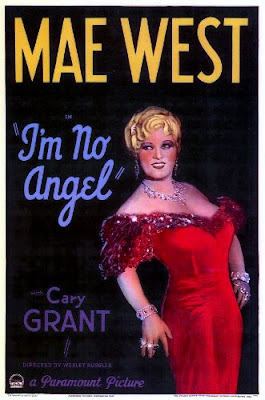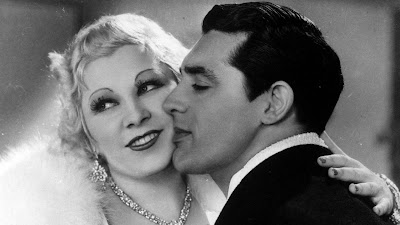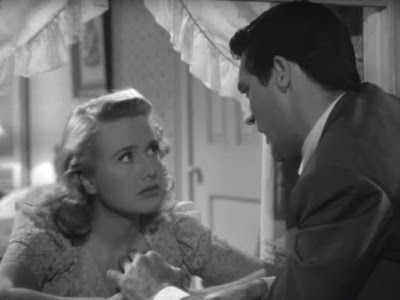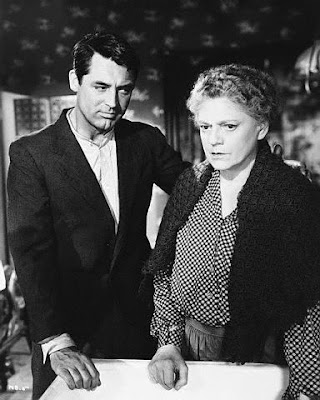On today's date back in 1944, Cary Grant's 47th full length feature film, Arsenic and Old Lace, was released.
Summary:
Mortimer Brewster (Cary Grant), a newspaperman and author known for his diatribes against marriage, ironically gets married then takes a quick trip home to tell his two maiden aunts (Josephine Hull and Jean Adair). While trying to break the news, he finds out his aunts' hobby: killing lonely old men and burying them in the cellar...
Cast:
Cary Grant...Mortimer Brewster
Priscilla Lane...Elaine Harper
Raymond Massey...Jonathan Brewster
Jack Carson...O'Hara
Edward Everett Horton...Mr. Witherspoon
Peter Lorre...Dr. Einstein
James Gleason...Police Lt. Rooney
Josephine Hull...Abby Brewster
Jean Adair...Martha Brewster
John Alexander...'Teddy Roosevelt' Brewster
Grant Mitchell...Reverend Harper
Edward McNamara...Brophy
Garry Owen...Taxi Cab Driver
John Ridgely...Saunders
Vaughan Glaser...Judge Cullman
Chester Clute...Dr. Gilchrist
Charles Lane...Reporter
Edward McWade...Gibbs
Did You Know?
Some 20 years before filming this movie, actress Jean Adair had helped to nurse a very sick vaudeville performer named Archie Leach back to health; by the time she was asked to reprise her Broadway "Arsenic and Old Lace" role as Aunt Martha for this film, Adair and Leach, now known as Cary Grant, were old friends.
Cary Grant considered his acting in this film to be horribly over the top and often called it his least favorite of all his movies.
On stage, Boris Karloff played the monstrous Jonathan Brewster, Raymond Massey's film character, who, in eerie-looking screen makeup, resembled Karloff, which was a running gag throughout the picture. Karloff eagerly wanted to do this film, but he was kept under contract by the Broadway play producers and was not allowed to do the picture, to his immense displeasure.
Amy Archer-Gilligan, Americas most prolific female serial killer, has been cited as the inspiration for the play, and subsequently the film. She was charged with the poisoning deaths of her two husbands and was allegedly responsible for the deaths of 66 other elderly "inmates" of her nursing home. Her weapon of choice? Arsenic.
Frank Capra noted that while he was stationed in London in January 1943, he overheard American and British soldiers screaming "Charge!" in the manner of the "Teddy Roosevelt" character and deduced that they had seen the film. He then learned that Jack L. Warner had released the picture to the armed forces that month, a year after it was completed, and almost two years before it was released to the general public.
The Broadway play opened January 10, 1941. The film was shot between October 20 and December 16, 1941 while the play was still running, with most of the play's cast playing their roles in the movie. Editing on the film was completed by Capra in January 1942, followed by some post production work in February, when the film was ready for release. However, Warner Brothers had been contractually required to wait for the play to finish its run before releasing the movie, and as the subject matter had a particularly macabre theme, prompted as well by obvious Halloween references, it was hoped that the play would have finished for an October 1942 release. By January 1943, the play was still running domestically, so Warner got permission to show it to the U.S. Armed Forces who were stationed on overseas bases during that month. When the play finally finished its Broadway run on June 17, 1944, it was decided to release it ahead of Halloween, receiving its token film debut on Broadway at the Strand Theatre on September 1, 1944, followed by the nationwide release on September 23, two and a half years after the film had been completed.
In none of his closeups does Raymond Massey ever blink.
Throughout the film, the grandfather clock below the staircase (the minute hand of which always drops to the '6' position when "Teddy Roosevelt"/Johan Alexander slams his door) keeps correct time, i.e. it advances in time with the action. This is an extremely uncommon feature in movies, where clocks usually are left to show whatever time someone happened to set them for).
Cary Grant: [name] Grant's birth name Archie Leach appears on a tombstone in the cemetery near the Brewster's house. In Grant's earlier picture His Girl Friday (1940), his character Walter responded to a threat by saying "listen, the last man that said that to me was Archie Leach just a week before he cut his throat." As a gag, the departed Mr. Leach was apparently interred in the Brooklyn cemetery by the Brewster's home.
Quotes:
Mortimer Brewster: Look I probably should have told you this before but you see... well... insanity runs in my family... It practically gallops.
Mortimer Brewster: The name Brewster is code for Roosevelt.
Teddy Brewster: Code for Roosevelt?
Mortimer Brewster: Yes. Don't you see? Take the name Brewster, take away the B, and what have you got?
Teddy Brewster: Rooster!
Mortimer Brewster: Uh-huh. And what does a rooster do?
Teddy Brewster: Crows.
Mortimer Brewster: It crows. And where do you hunt in Africa?
Teddy Brewster: On the veldt!
Mortimer Brewster: There you are: crows - veldt!
Teddy Brewster: Ingenious! My compliments to the boys in the code department.
Aunt Martha: For a gallon of elderberry wine, I take one teaspoon full of arsenic, then add half a teaspoon full of strychnine, and then just a pinch of cyanide.
Mortimer Brewster: Hmm. Should have quite a kick.
Mortimer Brewster: Mr. President, may I have the pleasure of presenting...
Teddy Brewster: Doctor Livingston?
Dr. Gilchrist: Livingstone?
Mortimer Brewster: Uh, well, that's what he presumes.
Mortimer Brewster: Aunt Abby, how can I believe you? There are twelve men down in the cellar and you admit you poisoned them.
Aunt Abby Brewster: Yes, I did. But you don't think I'd stoop to telling a fib.

Mortimer Brewster: Look, Aunt Martha, men don't just get into window seats and die!
Abby Brewster: We know, dear. He died first.
Mortimer Brewster: Wait a minute! Stop all this. Now, look, darling, how did he die?
Abby Brewster: Oh, Mortimer, don't be so inquisitive. The gentleman died because he drank some wine with poison in it.
Mortimer Brewster: How did the poison get in the wine?
Martha Brewster: Well, we put it in wine, because it's less noticeable. When it's in tea, it has a distinct odor.
Mortimer Brewster: You mean, you... You put it in the wine!
Abby Brewster: Yes. And I put Mr. Hoskins in the window seat, because Reverend Harper was coming.
Mortimer Brewster: Now, look at me, darling. You mean, you mean you knew what you'd done and you didn't want the Reverend Harper to see the body?
Abby Brewster: Well, not at tea. That wouldn't have been very nice.
Mortimer Brewster: Oh, it's first-degree.
Abby Brewster: Now, Mortimer, you know all about it and just forget about it. I do think that Aunt Martha and I have the right to our own little secrets.
[to Mortimer]
Elaine Harper: We were married today. We were going over Niagara Falls in a barrel. Your brother tries to kill me. A taxi is waiting and now you want to sleep on a window seat. You can take the honeymoon, your wedding ring, your taxi, your window seat, and put 'em in a barrel and push 'em all over Niagara Falls!
Lobby Cards:

Directed by Frank Capra.
Produced and distributed by Warner Bros.
Running time: 118 minutes.
Artwork by Rebekah Hawley at Studio36.






















































